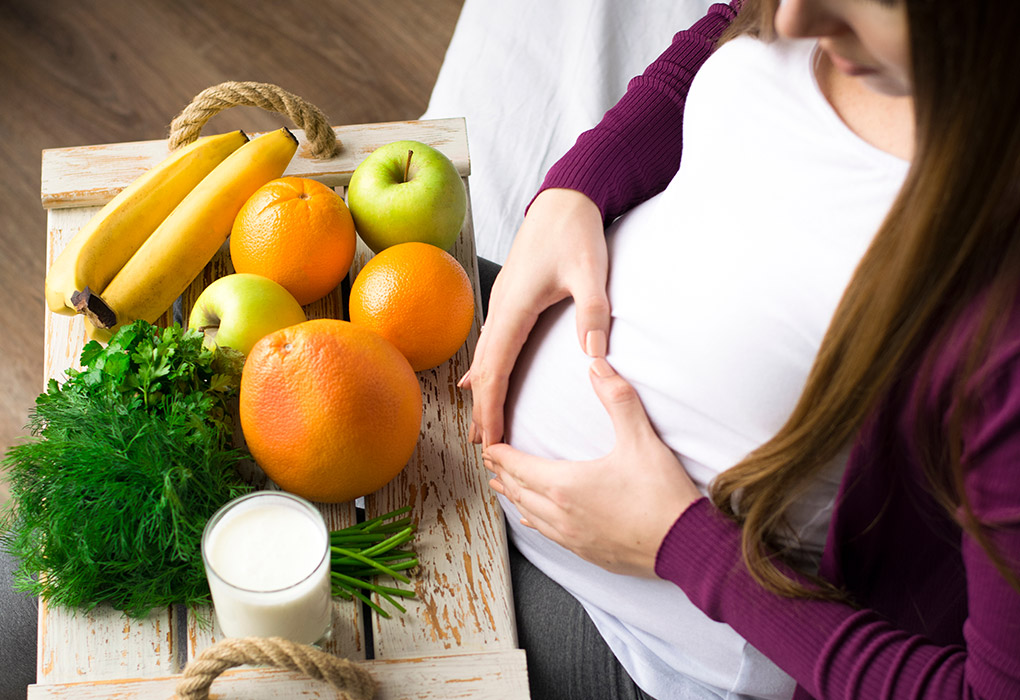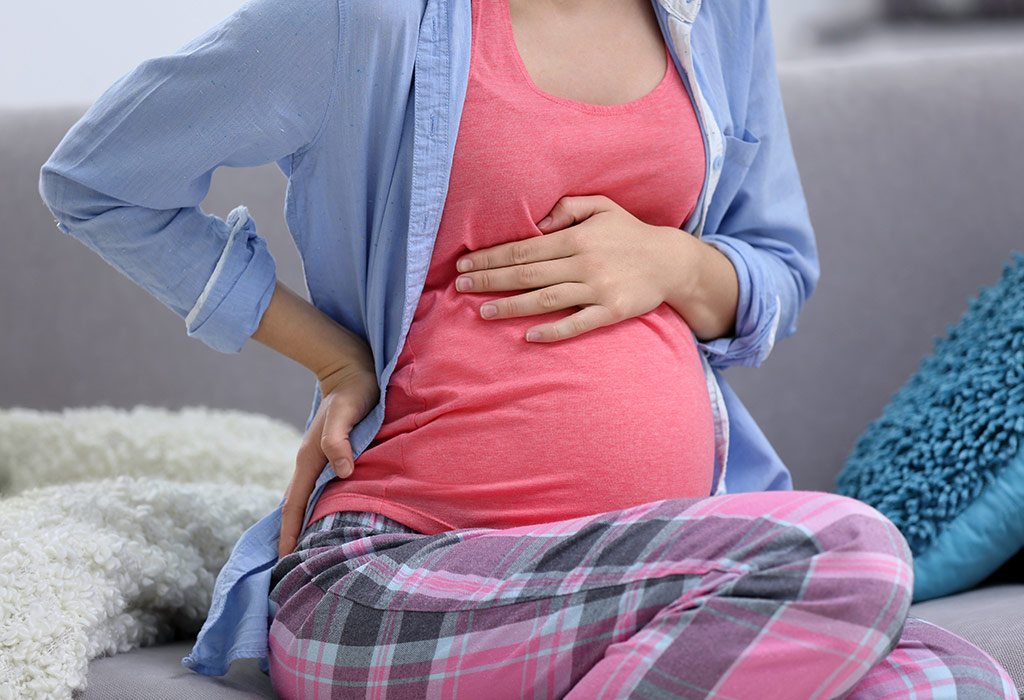In this Article
You have very little to wait now before you have your bundle of joy all wrapped up in your arms. If you have any questions about your 31st week, you can read on and prepare to welcome your newborn.
Your Baby’s Growth During Pregnancy – Week 31
By this time, your baby’s brain development is at full speed. Billions of synapses are forming between its neurons, all receiving constant information from all five senses. The baby whiles away the time inside the womb by practising expressions, breathing, swimming around in the amniotic fluid, and sucking his thumb. Your baby now responds to the sound of your voice with a range of kicks and punches, but they won’t be hard enough to cause any serious pain or injury. Some babies hiccup constantly, so be prepared to be jolted awake at night by the sound of his hiccups. Your little one has fully functional eyes at this point, allowing him to respond to light. The amounts of muscle and fat on the body are higher than ever. You will also notice him swaying to any melodies you play for him.
What is the Baby’s Size
At 31 weeks pregnant, the baby’s size is around the same as a tender coconut. Weighing around 1.5 kg, the baby measures more than 40 cm from head to toe.
Common Body Changes
Carrying your little pumpkin around is getting tougher and tougher every week. You will experience another host of body changes during pregnancy at 31 weeks.
- Difficulty Breathing: With the foetus pushing your uterus upwards constantly, your lungs are going to feel cramped for space. This will have you taking shallower and fewer breaths than usual, but luckily you don’t have to worry about your little one as he gets oxygen through your placenta. If you perform cardio regularly, it is time to slow down a little. Be prepared for shortness of breath as the pressure on your lungs is only going to increase in the coming months.
- Breast Discharge: Your breasts are going to be producing a yellow fluid called colostrum, which is what your baby will feed on for the first three days after birth.
- Nail Breakage: Until now, your hair and nails were growing faster, but now your nails are going to feel a lot drier and easy to crack due to hormones. Take precautions by keeping them cut short.
- Braxton Hicks Contractions: These pseudo contractions will plague you significantly more now than ever. Staying hydrated and not sitting or lying down in the same positions will help alleviate some of this discomfort.
- Increase in Blood Volume: Due to the number of nutrients and oxygen being taken to your placenta, you have approximately 50% more blood than normal.
Symptoms of Pregnancy At Week 31
In the middle of the third trimester, pregnancy symptoms are only going to get more varied and less bearable. However, staying aware of any pains or discomfort and knowing their solutions will help you get through them quickly enough.
- Constant Urination: Get ready to run to the bathroom much more frequently than you used to. The pressure on your bladder is not going to give it enough space to collect as much urine as before.
- Back Pain: The weight of your baby is going to put pressure on your spine as well as change your posture. Your lack of balance might lead to clumsy behaviour as well. Make sure to stretch regularly and learn some good posture techniques.
- Difficulty Sleeping: This is not directly caused by the pregnancy itself, but occurs due to the sum of other factors interacting together, such as cramps, indigestion, waking up to urinate, or just inability to find a comfortable position to sleep in.
- Pelvic Pain: Pelvic pain can happen due to your expanding uterus pushing against the pelvic girdle. It can be quite difficult to bear, so refer to your doctor or physiotherapist for some exercises to ease the pain.
Belly At 31 Weeks of Pregnancy
At the onset of the 31st week, you should be around 10-12 kg heavier than normal. The extra weight is going to have you off-kilter but there is no reason to worry. Also, at around 30 cm from top to bottom, your belly is probably stretched to the breaking point so keep some moisturiser handy.
31 Weeks Ultrasound
Ultrasounds should now be a weekly affair so the doctor can keep an eye on the pregnancy, especially if you have complications such as diabetes or are carrying multiple babies. The scan will show that your baby is now almost completely formed, including all of his organ systems. This is the time for your little boy’s testicles to descend into the scrotum, or your little girl’s clitoris to develop fully. You can also have a 3D ultrasound done, which will show the detailed features of your baby’s face and body.
What to Eat?
Your baby’s health depends on your diet, so ensure you get proper portions of protein, fruits, veggies, whole grains, and dairy. It is preferable to eat smaller meals more frequently to stave off indigestion and stomach cramps. Fried, processed and fat-rich foods should be avoided or eaten only sparingly. Some of the changes to make in your 31st-week pregnancy food are:
- Vitamin C and Iron: As your little one has started to make his own blood cells, he needs more iron in his diet. Adding some Vitamin C will help the iron absorb better. Eat foods like spinach, citrus fruits, fish, lean meats and green vegetables.
- Calcium: Calcium is absolutely essential as your foetus’ bones, cartilage and nails are developing. In addition, you need calcium as well to stay fighting fit. Consume milk, cabbage, spinach, tofu, paneer and soybeans for calcium.
Although your body needs both iron and calcium, be careful not to consume both supplements together as calcium can block the absorption of iron in the body. You can take individuals supplements at different times during the day to avoid this.

Tips & Care
Here are a few tips that will come in handy at this point of your pregnancy:
Dos
- This is the right time to apply for a prenatal class. The trainers are well equipped to deal with all issues pertaining to childbirth, such as pain management, stress relief and caring for your newborn.
- It is not too early to keep your hospital bag packed and ready.
- Always drink at least 2-3 litres of water a day to stay fresh and hydrated.
- Perform exercises like the Kegel to strengthen the floor of your pelvis.
Don’ts
- Don’t ignore the kicking of your baby. Research has shown that learning the kick pattern of the foetus is linked to a decrease in stillbirth.
- Don’t assume facial swelling has to do with gaining weight. It might also be a sign of preeclampsia, so talk to your doctor immediately.
What You Need to Shop For
It might be time for you to think about how you want your newborn’s room decorated. Buy enough maternity clothes to last the pregnancy, but don’t forget post-pregnancy clothes as well. You should also consider buying feeding equipment like nursing bras, bottles, and so on. If you’re buying a crib for your baby, don’t purchase those with bumpers and certainly don’t keep pillows, toys or blankets in there, as these objects increase the risk of SIDS (sudden infant death syndrome). Also, consider buying an outdoor pram so you can take your baby along with you for some fresh air.
As the date of delivery will soon be upon you, it is best if you’re prepared well in time to enjoy the presence of your newborn. All the best!









